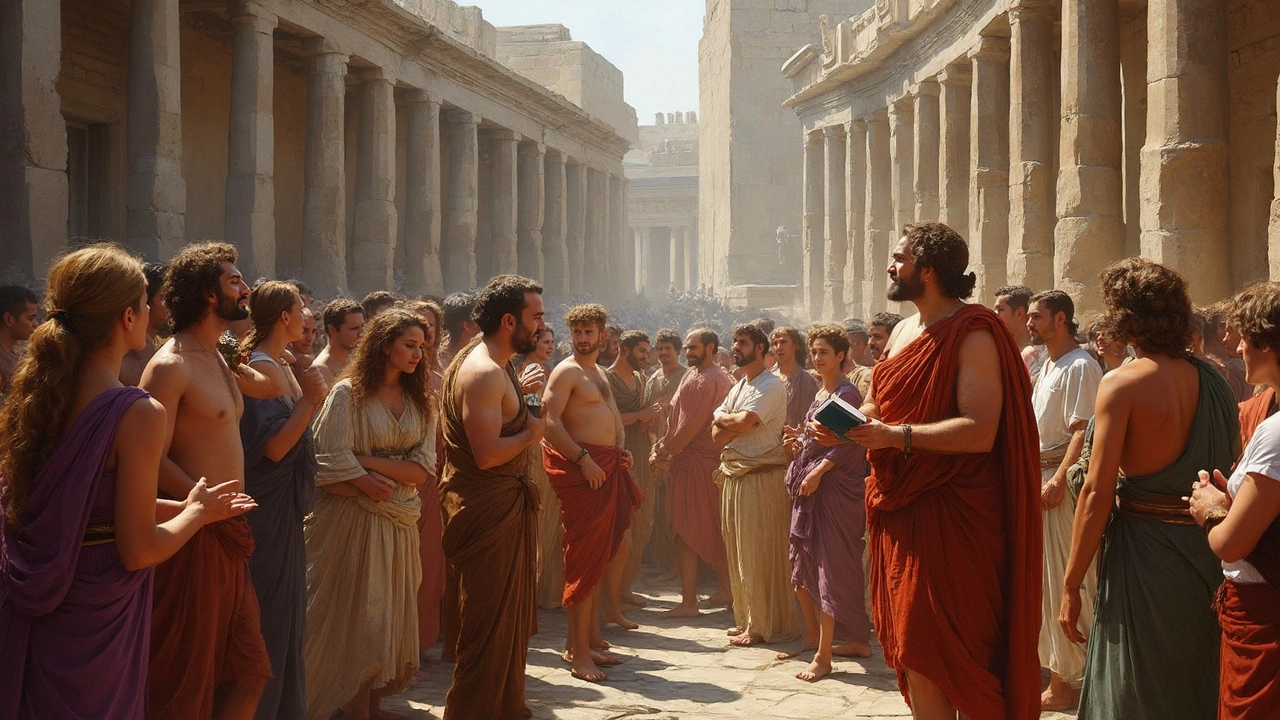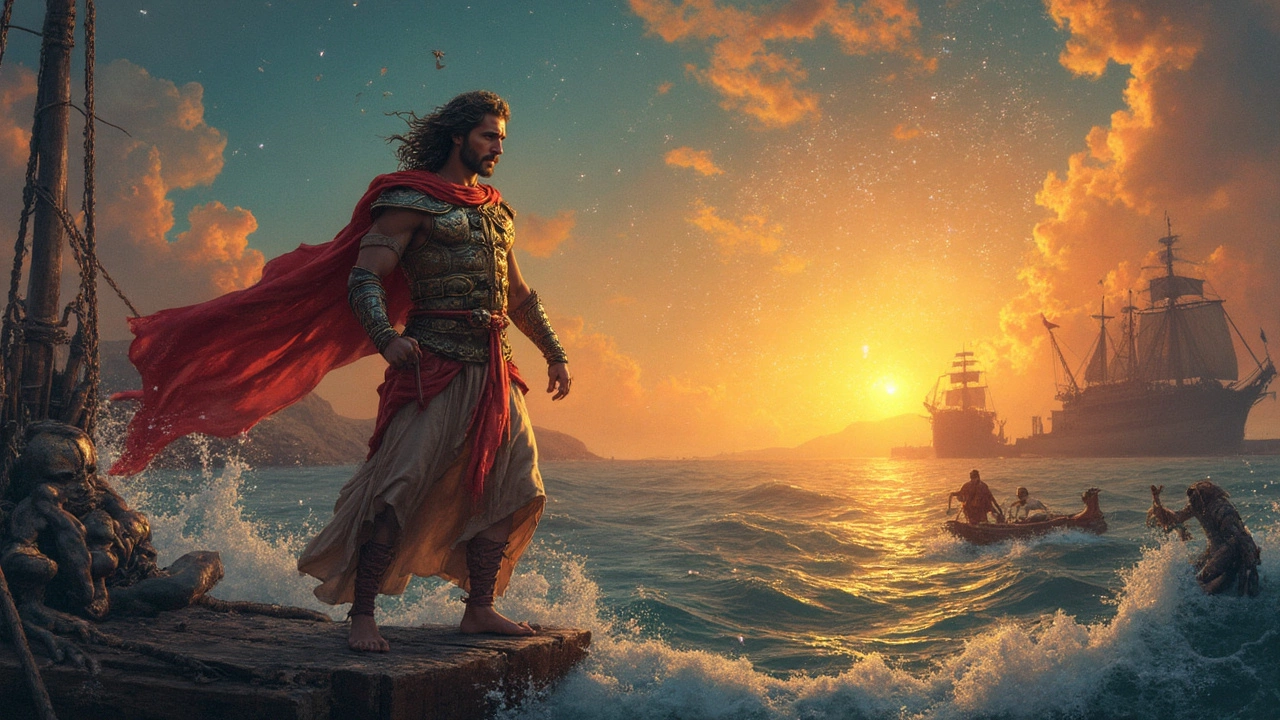Ah, The Odyssey. The epic tale that every high school student either remembers with a groan or genuine fascination. But what is it really? A grand piece of historical fiction or simply an ancient myth passed down through the ages? First off, let's get clear on one thing: The Odyssey is as much about historical events as my dog Oscar's dreams are about reality. But that’s where it gets interesting.
This epic, packed with gods, giants, and cyclopes, might seem like pure myth at first glance. But there's also a hint of truth hidden in those verses. Homer, or whoever penned this masterpiece, might have drawn on real places and events. Perhaps like me reaching for the last cookie while my kids, Thalia and Quentin, aren’t looking? It’s a blend—a mix of the factual and fantastical.
Let's break down the story and its characters. Odysseus's journey is a wild one, no doubt. With the siege of Troy as its starting point, some might wonder if there’s more history here than meets the eye. The Trojan War was supposed to have happened around the 12th century BC, and archaeologists say Troy was likely a real city. See where I'm going? Homer’s tale finds a basis in history, even if it's like historical fiction wearing a very colorful hat!
- The Story of The Odyssey
- Homer: Poet or Historian?
- Myth vs. History: A Blurred Line
- Influence on Ancient and Modern Culture
The Story of The Odyssey
So, let's jump into the whirlwind of adventures in The Odyssey. Picture this: Odysseus, the hero, is trying to find his way home after the fall of Troy. His journey takes a mere ten years—talk about a long commute! One wrong turn after another, thanks to angry gods and mythical creatures, keeps him at bay from his beloved Ithaca and his wife, Penelope.
The story starts after the Trojan War. Odysseus, a cunning warrior who played a crucial role in the Greek victory (remember that sneaky wooden horse?), wants to reunite with his family. But Poseidon, the god of the sea, has a grudge against him for blinding his son, the Cyclops Polyphemus. Watch out, sailors!
Odysseus's path is anything but smooth. He encounters the one-eyed Cyclopes, maneuvers past tempting Sirens with their irresistible songs, and outsmarts the sorceress Circe, who amusingly turns men into pigs, among other challenges. Each stop delays him, testing his wits and willpower.
Back home in Ithaca, things aren't looking rosy. Suitors are swarming like bees around honey, trying to woo Penelope and take over Odysseus's throne. But she’s clever, keeping them at bay with a fabric weaving trick that involves an endless tapestry.
Finally, with the help of Athena, the goddess of wisdom and war (talk about useful connections), Odysseus returns incognito. Disguised as a beggar, he assesses the situation before revealing himself. In a dramatic showdown, he shoots an arrow through twelve axe shafts and reclaims his home and family, restoring order.
And boom, just like that, the long tale of wandering ends, blending myth with a touch of possible historical reality. My kids would say Odysseus's journey is epic enough to challenge even the most complex video game plots. Who knew the ancient Greeks were such master storytellers?
Homer: Poet or Historian?
When it comes to Homer, the big question is whether he was more of a poet spinning myths or a sneaky historian who liked throwing folks off with some literary flair. Let's tackle it: we know The Odyssey is attributed to him, but historians still debate if Homer was even a real person. He’s a bit like Bigfoot—everyone talks about him, but nobody's sure they’ve ever spotted him.
Here's what we know: Homer gave the world epic tales with a flavor that suggests there might be some historical truths beneath the layers of myth. Think about how he describes places like Troy or even details of the Trojan War. Archaeologists have found real evidence of Troy’s existence, like ruins that match descriptions in his works. So, Homer might have been onto something, even if he colored it with a few imaginative strokes.
Some scholars reckon Homer lived around the 8th century BC. Although this date is kind of a best guess, it’s when folks believe The Odyssey was penned. The poetry style and dialect suggest it was woven from various regional tales, pieced together over time. It's plausible that Homer absorbed real events from Greek history and culture and served them up with a dollop of fantasy.
This mix makes Homer less of a straightforward historian and more of a talented storyteller who happened to incorporate real elements. He crafted stories easier to remember, especially back in the day when oral storytelling was how folks passed the time (like binge-watching Netflix, but with better vocabulary!). Whether he meant to record history or simply entertain, Homer's works have helped shape how we view ancient Greece.

Myth vs. History: A Blurred Line
Diving into whether The Odyssey is historical fiction means walking a tightrope between myth and reality. Homer didn't leave us with footnotes or a bibliography, so historians and readers are left piecing together clues.
Let's start with the basics. The Trojan War, a central event in both The Odyssey and The Iliad, actually has some archaeological backing. The ancient city of Troy, located in modern-day Turkey, is considered to have existed. Excavations by Heinrich Schliemann in the 1870s brought many to believe that a war could have happened, although maybe not with all the legendary heroes.
So, what's the deal with Odysseus's trip? Many locations he visited blend real geography with mythological twists. Ithaca, Odysseus's home, is a real place—a Greek island today, though identifying it has been a puzzle for historians. The locations like the land of the Lotus-Eaters, or the cave of the Cyclops, might have elements based on seafarers' real journeys, exaggerated to entertain and inspire.
The historical setting—ancient seas, city-states, and warrior cultures—can be seen as representing the Mycenaean period, a real historical era. The details of daily life, from shipbuilding methods to warrior tactics, align with known historical practices.
However, could the involvement of gods like Zeus and Athena, tipping the scales of mortal fortunes, be based on real beliefs? Ancient Greeks held deep convictions regarding their deities, and religious practices were woven into daily life, perhaps reflected in these divine cameos.
The challenge is separating Homer's dramatic flourishes from facts. Picture it like Quentin finding similarities between superheroes and ancient warriors—they’re drawn from some truth, but with a big dash of imagination. For readers and historians, the joy is in pondering what might have been real among these tales.
Influence on Ancient and Modern Culture
Okay, picture this: no running water, no electricity, and definitely no smartphones. That's ancient Greece for you. Yet, even ages ago, The Odyssey was a total blockbuster. It was like the ancient version of that one movie everyone talks about (but way cooler, because it’s stood the test of time). Homer’s work was a staple in Greek education, tweaking minds back then just like it does now. It’s a bit like how we all remember the lyrics to our favorite songs, except kids back then memorized epic tales instead.
The Odyssey didn’t just stop at Greece, though. Fast forward a few centuries, and boom! Renaissance folks were all over it, seeing it as a window to the world of imagination and human experience. This epic even got a nod from Shakespeare and Dante—talk about some high-profile fans. Plus, it wasn’t just dusty books and quirky art pieces; The Odyssey shaped storytelling itself. Heroes like Odysseus paved the way for the flawed but lovable protagonists we cheer on in today’s blockbusters.
Modern pop culture gives a hearty nod to The Odyssey too. Look at Hollywood. Whether it’s space adventures a la Star Wars or epic journeys like The Lord of the Rings, the influences are everywhere. It’s like every hero’s journey comes with a tiny piece of Odysseus’s DNA. And hey, if you’ve ever sat through a binge-worthy series featuring some epic trekking, now you know where some of those vibes stem from.
The moral craftiness and enduring themes of The Odyssey continue to echo. They teach us lessons on homecoming, resilience, and the eternal battle between the underdog and their challenges. Whether you’re reading it for a class assignment or just out of curiosity, the epic’s fingerprints on culture and storytelling are as clear as day. So the next time someone rolls their eyes at the mention of ancient epics, drop some of this knowledge and watch their jaws drop—Odyssey style.

